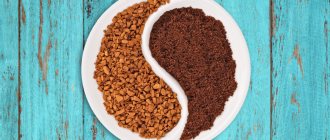Everyone knows about the benefits of coffee, but few people know that this invigorating drink can turn out to be a drug. I'm ready to share my experience. You probably greeted this morning with a cup of aromatic coffee? What's bad about it? Just one thing - caffeine has the ability to cause addiction in some people.
For nine years I was addicted to caffeine. At first I drank 1-2 cups of coffee a day. Coffee invigorated me and gave me energy. I associate happy moments in life with a cup of coffee: the joy of waking up, meeting friends, insights and victories. Then the “dose” had to be increased to 4-6 cups, the euphoric effect lasted exactly 40-60 minutes, and then a sharp decline occurred. In moments of decline, I became aggressive, irritated and looked for a replacement. I drank more tea instead of coffee, tried to find an alternative.
I began to notice how hundreds of people, morning, afternoon and evening, press buttons on coffee machines and wander into coffee shops to get an extra dose of caffeine. I was surrounded by the same “zombies” as me.
Withdrawal from not receiving a cup of coffee on time led to the idea that it was an addiction. I began to study literature, scientific research and understand the essence of the issue. Do I control my desires or does a cup of coffee control me?
Benefits of coffee
There are many points, but coffee is beneficial specifically for healthy people:
- Affects brain activity, speeds up thinking.
- Accelerates metabolism in the body.
- After a cup of coffee, muscle tone increases.
- Coffee gives energy and pleasure, as hormones - dopamine and serotonin - are actively produced.
- Caffeine really stimulates the nervous system, promotes the production of adrenaline, and increases endurance, which is actively used in sports and fitness.
- Caffeine reduces the risk of stroke and urolithiasis.
- Caffeine can relieve headaches and migraines.
Despite the huge number of advantages, there are also disadvantages.
Is caffeine a magic energy pill?
Is coffee really that good? If this is true, then coffee drinkers must be practically superheroes, or at least much more productive than non-coffee drinkers. However, this is not very similar to how things are in ordinary life: if you drink coffee regularly, it does help you concentrate and overcome lethargy and drowsiness, but overall performance is not so different between those who drink coffee and those who do not. who does not drink or drinks extremely rarely. How so?
Current
- A new source of mysterious fast radio bursts in space has been found
- Physicists have determined the mass of a hypothetical quantum particle axion
- Scientists have created a detailed scheme for removing waste from the brain
The fact is that regular consumption of coffee is addictive. Our brain strives to normalize its condition, taking into account all the external factors that it regularly encounters. It is not normal not to feel tired, and if for some reason the signals of fatigue have stopped coming, you need to increase your sensitivity to them. If caffeine is continuously introduced into the nervous system over several weeks and blocks adenosine's fatigue signals, the number of adenosine receptors in the brain gradually increases to restore previous responsiveness. In some studies, it took two to three weeks for participants to see almost no effect from coffee—its residual effect on participants' energy levels was barely noticeable.
Regular consumption of coffee causes real physical dependence. However, chemical addiction specialists do not classify coffee as a dangerous psychoactive substance. People who are accustomed to coffee are usually able to give it up, despite the unpleasant consequences of lethargy and lack of concentration.
Caffeine withdrawal (scientifically called withdrawal) occurs approximately half a day after the last dose of caffeine. Be that as it may, caffeine gradually breaks down and ceases to occupy adenosine receptors, of which coffee lovers have much more than they need. While there is caffeine, only a few free receptors work, but when it does not arrive for a long time, all the receptors are involved in carrying out signals of fatigue from adenosine, and this is absolutely not what helps the coffee addict feel normal.
Caffeine is so tightly integrated into the functioning of the nervous system that without it it ceases to function normally.
Caffeine addiction: is coffee a drug?
Statistics say that about 30% of people have signs of caffeine addiction:
- Without coffee, the body simply refuses to work normally: there is no vigor, there is constant fatigue.
- Even with constant fatigue, insomnia torments.
- Increased anxiety, agitation and irritation.
- Sometimes dizziness and trembling in the hands.
- A drink is needed not to cheer up, but to simply feel good.
In the International Classification of Diseases (ICD), caffeine abuse is considered a mental illness, which falls under the heading “Mental and behavioral disorders caused by the use of other stimulants (including caffeine).”
According to the University of Melbourne (Australia), caffeine is the most common “psychoactive drug” in the world.
If you notice signs of caffeine addiction, you may be at risk.
Withdrawal syndrome
As a result, you have to pay for regular coffee consumption: in fact, everything that improves under the influence of caffeine becomes noticeably worse when it is withdrawn.
In the absence of caffeine, adenosine, which has not gone anywhere, gets the opportunity to contact all its receptors that were previously occupied by caffeine. Signals that caffeine helped to ignore for the time being suddenly fall upon a system that is not prepared for such pressure. Everything signals that fatigue is off the charts and a person urgently needs to rest, putting everything aside. It takes a lot of time to readjust and return to its original state the brain settings that have been disrupted by caffeine. In fact, this requires removing all the extra receptors that have gradually appeared on many neurons throughout the brain.
Symptoms of caffeine withdrawal practically replicate the positive effects of caffeine, only with the opposite sign. Instead of an elevated state (which has long been no longer especially elated, but rather just normal), a person slides into an energy hole. Without the usual dose of caffeine, lethargy, fatigue, weakness, lethargy, drowsiness, absent-mindedness set in, difficulty concentrating, a feeling of dissatisfaction, irritability, depressed mood, inability to think clearly, and headache. It’s as if a person is unplugged and the nervous system goes into energy saving mode - in fact, the brain fully receives adenosine fatigue signals, which it learned to ignore thanks to caffeine.
People who are not used to drinking coffee feel much better in the morning than coffee lovers. The magical effect of morning coffee, which literally transforms us and allows us to wake up, cheer up and look at the world more cheerfully, is associated not with how good we feel with coffee, but with how bad we feel without it.
Six days without caffeine is enough to relieve coffee withdrawal symptoms.
This time is enough for coffee withdrawal symptoms to disappear, but not enough to return the brain to its original pre-addiction state. Several studies in which people were deprived of caffeine for longer periods of time—three to six weeks—have found that coffee has a greater impact on performance: it may be that our internal adenosine system takes longer to not only compensate for the missing coffee, but also - truly recover and switch to a caffeine-free mode of operation.
Signs of addiction
Your morning starts with a cup of coffee. You drink coffee for breakfast, lunch and dinner. Without coffee, you can't think clearly and experience overwhelming sleepiness. You become irritable if you were unable to drink your treasured cup of coffee. Without coffee, your health deteriorates sharply. You drink 3-4 or more cups of coffee a day.
To diagnose it, stop drinking caffeine for 1-2 days. The following symptoms are a direct indicator of a painful need for an invigorating drink:
headaches, constant fatigue, dizziness, depression, irritability, problems with concentration, nausea, muscle weakness.
It will take a month for complete recovery. The first week of rehabilitation will be the most difficult. These tips will help you fight coffee addiction:
Choose a time. In the first week of quitting caffeine addiction, cancel important tasks, reports, and do not take on important tasks, projects, plans.
Free time. Engage in useful activities. Don't give in to laziness, otherwise the feeling of weakness will not leave you for a long time.
Don't judge yourself harshly. Take failures positively, don’t beat yourself up. Continue with the plan. If you cannot overcome drowsiness and fatigue in the first days, gather your strength and get out of bed on the third day. Sooner or later this must happen.
Watch your diet. The addiction to coffee is accompanied by a ritual need for sugar. Try to remove sweets from your diet and anything that reminds you of the traditional drinking of an aromatic drink.
Find a replacement. Coffee will be replaced by herbal teas, hibiscus, water with lemon, and sugar-free juices.
Relax. In the evening, take warm baths, do aromatherapy, sign up for a massage.
Change of traditions. Coffee lovers, along with an addiction to caffeine, form habits that accompany addiction. The most common is the desire to hold a cup of invigorating drink in your hands. Leave the glass, but fill it with tea, juice, water or another substitute drink of your choice.
Fight sleepiness. In the first 5 days, use a contrast shower and rubbing to combat drowsiness. Morning exercises will help you wake up, which will become a new useful ritual.
Follow the regime. Go to bed and wake up at the same time every day.
Be aware of the influence of light. Turn off your computer an hour before bed, put cell phones away, and dim the lights. Choose fluorescent lamps that emit warm light or buy a dim lamp.
If this information frightens you, and you prefer caffeine addiction to the energy spent on healing, read about the possible harm of caffeine and its consequences for the body. This will help you weigh the pros and cons .
General information
The human body, and especially the psyche, is a delicate matter. And habits that take years to form are not always directly related to painful addiction.
To eliminate serious pathologies, doctors involve specialists of different profiles - it is so difficult to overcome real addiction, for example, alcohol or drugs.
Therefore, to eliminate the unhealthy habit of consuming a lot of caffeine, it is not necessary to resort to drug treatment .
And although outwardly excessive attachment to coffee may look like drug addiction, you should not be afraid of it.
But when this fact is established, the fight for health must begin immediately, especially since this is a feasible task for a competent and strong-willed person, unlike many cases of alcohol or drug addiction. It must be remembered that the consequences of abuse of even such a tasty drink as coffee may be irreversible.
And at the same time, for the sake of fairness, it is necessary to mention the undeniable health benefits of moderate coffee consumption:
- coffee relieves depression;
- improves memory;
- gives a feeling of vigor and energy;
- useful for mental activity;
- good for the cardiovascular system;
- helps with hypotension.
You can learn more about each property by clicking on the corresponding link.
There is a huge amount of scientific research proving the positive effect of this drink on various body systems. Obviously, there is not the slightest reason for a healthy person to completely abandon moderate coffee consumption.
But the article is devoted specifically to the abuse of the drink with the subsequent development of addiction. We will talk about this further.
Buy a cup one size smaller
If you used to always buy a large glass of coffee, now try buying only a medium size for a week. If this is still not enough for your body and it requires more, try a simple self-deception: agree with yourself that now you will drink a little less, but at the same time you can easily afford more, just not immediately, but after a break, a meeting or certain work. This way your brain will calm down, and then switch to something else and completely forget about its need.
Getty Images
Causes of the problem
Caffeine addiction develops if you consume large amounts of the aromatic drink for a long time.
Some of the main causes of caffeine addiction include:
- frequent use of gadgets and the latest technologies, which lead to a malfunction of the so-called human biological clock - spending the whole day in front of a computer monitor, only a strong drink helps get rid of drowsiness;
- lack of sleep - with the help of aromatic drinks they often get rid of chronic drowsiness, but over time a larger dosage is required;
- the habit of replacing the existing lack of time for a full meal with a cup of aromatic coffee;
- Smoking – under the influence of nicotine, the effect of caffeine is reduced, so smokers often drink significantly larger volumes of caffeinated drinks.
The main reason for the development of a caffeine “problem” is the consumption of more than 500 mg of the drink during the day. This is about 5-6 medium sized cups.
Caffeine addiction is a problem that develops gradually. There are ways to help you get rid of an unpleasant habit and improve your well-being.
The symptoms of coffee addiction are as follows:
- Coffee is consumed much more often than usual (the norm is the aforementioned 2 cups per day, although, again, everything is individual), in large quantities and for a long time. Simply put, taking it in abundance becomes a habit;
- concentration is impaired, it becomes difficult to concentrate on a task, even the most basic, difficulties arise with setting priorities;
- apathy and chronic fatigue are felt;
- causeless anxiety may arise, and behavior against this background becomes hyperactive;
- tremors in the limbs and photophobia are manifested. Thoughts are confused, speech is pronounced faster than usual, may be inconsistent, abrupt;
- depression appears and develops, which, as a rule, is accompanied by stereotypy - a pathological craving for repeated repetition of “honed”, habitual actions (such as lining up pencils in a clearly defined sequence or frequently shaking off non-existent crumbs);
- With all the problems listed above, it is impossible to part with caffeine - the drink, which provokes physical and mental deterioration, is consumed again and again. The process cannot be controlled; drinking coffee no longer brings the former pleasure, does not supply the required energy, but becomes only a means of satisfying the need.











